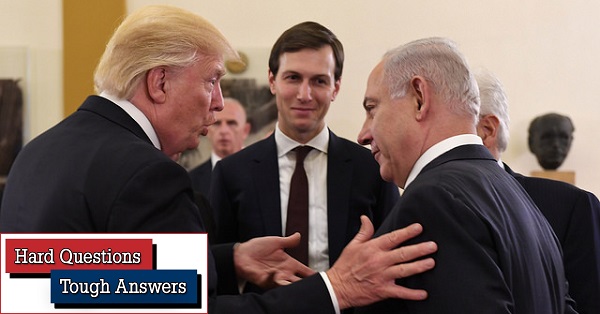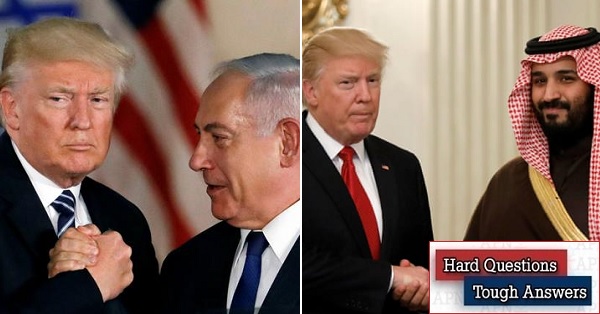Yossi Alpher is an independent security analyst. He is the former director of the Jaffee Center for Strategic Studies at Tel Aviv University, a former senior official with the Mossad, and a former IDF intelligence officer. Views and positions expressed here are those of the writer, and do not necessarily represent APN's views and policy positions.
Q. Last week witnessed two dramatic events that are linked to Israel’s April 9 elections: Attorney General Avichai Mandelblit filed corruption charges against PM Netanyahu, and Trump adviser Jared Kushner offered details of the peace proposal the administration plans to deliver immediately after those elections. What’s the election connection?
A. Netanyahu initiated these April elections earlier than required constitutionally or
politically, precisely because he wanted to be reelected before Mandelblit filed his charges. Mandelblit’s response
was to hasten the legal process precisely because he refused, as the state’s chief legal officer, to play politics.
Accordingly, Netanyahu is now charged with bribery, fraud and breach of trust in no fewer than three separate cases
and his legal and moral/ethical status has become a major issue of contention in these elections.
Turning to Kushner and the “deal of the century” peace proposal, it has been in the works for the better part of
two years and its unveiling to the parties concerned, Israel and the PLO, has been postponed repeatedly. Now all
indications point to a decision to present it immediately after the elections and before the formation of a new
Israeli government begins. The idea behind this timing is apparently to influence the coalition-formation process
in order to ensure that the next government of Israel is favorably disposed toward the concessions the deal demands
of Israel, or at least is ready to discuss them constructively.
Q. Let’s start with the corruption charges. Have they affected the electoral picture?
A. Thus far, the polls indicate that after the charges were filed, one or two mandates
moved toward the center, thereby denying the Likud/right wing bloc a majority and giving Blue-White a six or seven
mandate lead over Likud and a potential blocking majority. But that lead is paper-thin; it could dissipate in the
weeks ahead once the corruption issue yields to more immediate headlines such as the security situation on any one
of three fronts (Gaza, internal West Bank, and Iran in Syria). Blue-White’s leaders appear to recognize that the
mere fact of the charges cannot be counted on to win them the election, while the effect of security issues is
unpredictable. They need something else.
Accordingly, Blue-White is reportedly readying an official platform that is more hawkish on the Palestinian issue
than the personal views of party leaders Gantz and Lapid. The idea is to deny Netanyahu and the Likud ammunition
for accusing Blue-White of being “leftist”, an epithet that thanks to years of right-nationalist-religious rule in
Israel has become grounds for accusations of muddled thinking if not outright treason.
Thus, media reports indicate that the platform will not mention a two-state solution, a Palestinian state or a
unilateral Israeli withdrawal from parts of the West Bank--ideas promoted by Gantz in the landmark speech in which
he introduced his candidacy. Instead, it will advocate “a regional conference to advance separation from the
Palestinians”. This is closer to positions advocated by Netanyahu and Trump’s team (see below). The idea is
apparently that if the reality of a corrupt prime minister doesn’t pry votes away from the right, perhaps a more
Likud-like platform on the Palestinian issue will.
Q. This brings us to Kushner’s revelations. . .
A. Kushner told Sky News Arabic last week that the administration’s peace plan will
focus on “establishing borders and resolving final status issues”. He wants Israelis and Palestinians to “live
better lives” based on “freedom . . . respect . . . opportunity . . . and . . . security”. So far, this is all
motherhood and apple pie to advocates of a serious peace process.
But then Kushner goes murky and shallow. This befits someone with no real experience dealing with the conflict, who
harbors a clear bias toward maintaining Jewish settlement in the West Bank, and who believes in solving deep
strategic problems by throwing money at them. “The goal of reaching these borders is really to eliminate the
borders,” he tells the Arab world. “If you can eliminate borders and have peace and less fear of terror, you could
have freer flow of goods, freer flow of people and that would create a lot more opportunities”.
Establishing borders yet eliminating borders? This is apparently “economic peace”, an idea promoted by Netanyahu
and Trump based on the proposition that prosperity will persuade Palestinians to drop some of their most basic
demands like a capital in Jerusalem, the right of return and a state based on the 1967 borders, and to coexist with
the settlements (where they will work). It pretends the conflict is economic when in fact it is territorial,
religious, and an issue of clashing historical narratives. It assumes wrongly, and condescendingly, that
Palestinians with “full stomachs” will be compliant.
As part of the plan, Kushner wants to raise $25 billion from the Gulf Arab states to spend in the West Bank and
Gaza over the next decade. He wants the Saudis and Emirates to pressure the Palestinians to make what for them are
huge, existential concessions in return for money. He started to do this last October, but Palestinian leader
Mahmoud Abbas traveled to Riyadh and persuaded King Salman and his impetuous son Mohammad bin Salman (MbS, he of
the Khashoggi murder in Istanbul) to back off and reiterate support for core Palestinian demands. Now Kushner is
trying again in preparation for unveiling the Trump deal of the century.
Note that the theme of economic peace is everywhere when it comes to Trump. We saw it on display at last week’s
Trump-Kim summit in Vietnam, where Trump predictably promoted Vietnamese economic success as a peace model for
North Korea.
Q. It looks like Gantz or even Netanyahu would not turn down outright the
Trump-Kushner ideas for Israeli-Palestinian peace . . .
A. Netanyahu may even have had a hand in developing them. Still, he would need a less right-wing coalition to address these ideas. After all, Israel would undoubtedly have to withdraw from some West Bank territory to make the plan work and this is anathema to Netanyahu’s right-religious partners. The bottom line for Israel is that a “yes, but” response to the Trump deal of the century plan will suffice because the Palestinians and Arabs in general can be counted on to spike it.
Q. What is Kushner doing to persuade Abbas?
A. Beyond trying again to recruit Gulf Arab support and money, nothing. For more than a
year now, Abbas refuses to talk to the Americans. For its part, the Trump administration has denied funds to the
PLO and to UNRWA, which supports Palestinian 1948 refugees, and has moved the US embassy to Jerusalem--all steps
condemned by the Palestinian and broader Arab leadership. Note that, to prepare the Palestinians for Saudi economic
bounty, Trump has been impoverishing them.
Still, lest we forget, the Palestinian Authority is hopelessly fragmented between the PLO and Hamas and between the
West Bank and Gaza. As Abbas ages, his rule is weakening. There is no obvious successor. Everywhere there is unrest
over economic and security issues. As matters stand, a Trump administration peace proposal tendered by Kushner,
Greenblatt and the US team in mid-April is liable to be rejected outright by the PLO.
Nor does Kushner in his Arab world travels pay even lip service to the Arab peace initiative, a basic pillar in the
Arab peace platform. Meanwhile, Kushner is digging himself into an ever-deeper hole over additional, related
issues: for starters, the problematic narrative of his security clearance and his involvement in attempts to sell
American nuclear know-how to the Saudis--an initiative that even Israel opposes.
Q. Apropos the Saudis, is their general involvement as promoted by Kushner acceptable to the Palestinians and other Arabs?
A. We have already noted Abbas’s efforts to rebuff Saudi pressures to make concessions
on core Palestinian demands. But there is another wrinkle, and it concerns the Jordanian attitude. Traditionally,
and as anchored in the Israel-Jordan peace treaty, Amman plays a special role in guarding the sanctity of the
al-Aqsa Mosque, meaning in Muslim parlance the entire Haram a-Sharif (Holy Sanctuary, Temple Mount). In other
words, Jordan has to be included in an Israeli-Palestinian peace process with regard to both Islamic issues and
Jerusalem “real estate”. Kushner may not be fully aware of this.
Jordan’s role has become controversial in recent weeks--and not only because of an Israeli dispute with Jordanian
religious officials concerning access to a Muslim prayer site on the Mount. Jordan fears that Kushner’s peace plans
in some way would pave the way for a Saudi role replacing Jordan in the management of Arab and Muslim Jerusalem,
under Islamic cover. Indeed, such a scheme may have been discussed in clandestine Saudi-Israeli contacts, with US
knowledge, as a way for Netanyahu to tempt the ever-adventuresome MbS with his repeatedly proven poor strategic
judgment to move closer to Israel.
Jordanian-Saudi relations are in any case tense: Jordan needs Saudi financial support; a promised MbS visit has not
materialized; Amman does not see eye-to-eye with Riyadh regarding the priority assigned to actively opposing Iran’s
drive into the Levant. Now Turkey’s leader Erdogan, who is an ally of MbS’s enemies the Muslim Brothers and Qatar
and a bitter enemy of MbS over the Khashoggi issue, may be entering the Jerusalem controversy on Jordan’s
side.
For Kushner and his peace plans all these snags, current and future, should fall under the rubric of “beware what
you wish for”. For a host of reasons, a poorly-conceived and poorly-timed American peace plan could bring about
more rather than less conflict between Israelis and Palestinians. This has happened before--most recently when
Secretary of State John Kerry’s efforts in 2013-2014 ended up helping catalyze the summer 2014 Israel-Hamas war.
Déjà vu. That conflict, which solved nothing, lasted two months despite the efforts of PM Netanyahu, IDF Chief of
Staff Gantz, and a host of external parties including the US and Turkey.


